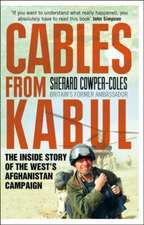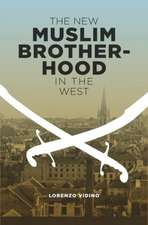Betting on the Africans: John F. Kennedy's Courting of African Nationalist Leaders
Autor Philip E. Muehlenbecken Limba Engleză Paperback – 15 mai 2014
| Toate formatele și edițiile | Preț | Express |
|---|---|---|
| Paperback (1) | 294.78 lei 31-37 zile | |
| Oxford University Press – 15 mai 2014 | 294.78 lei 31-37 zile | |
| Hardback (1) | 595.30 lei 31-37 zile | |
| Oxford University Press – mar 2012 | 595.30 lei 31-37 zile |
Preț: 294.78 lei
Preț vechi: 332.87 lei
-11% Nou
Puncte Express: 442
Preț estimativ în valută:
56.41€ • 58.68$ • 46.57£
56.41€ • 58.68$ • 46.57£
Carte tipărită la comandă
Livrare economică 04-10 aprilie
Preluare comenzi: 021 569.72.76
Specificații
ISBN-13: 9780199380718
ISBN-10: 0199380716
Pagini: 362
Ilustrații: 14 illus.
Dimensiuni: 233 x 161 x 22 mm
Greutate: 0.52 kg
Editura: Oxford University Press
Colecția OUP USA
Locul publicării:New York, United States
ISBN-10: 0199380716
Pagini: 362
Ilustrații: 14 illus.
Dimensiuni: 233 x 161 x 22 mm
Greutate: 0.52 kg
Editura: Oxford University Press
Colecția OUP USA
Locul publicării:New York, United States
Recenzii
Unlike other accounts of U.S. /Africa relations, Muehlenbeck's monograph covers the entire continent. Muehlenbeck's portrait of a charismatic American president engaged with the details of African political and economic aspirations is a contribution to the study of U.S./Africa relations as well as the JFK era.
Muehlenbeck's well-researched work offers a compelling challenge to the conventional wisdom of continuity in American Cold War foreign policy toward Africa. The book's deep examination of the courtship of African leaders by President John F. Kennedy provides a unique perspective on personal diplomacy, specifically, and U.S.-African relations, generally, during one of the more volatile periods of the Cold War. A thought-provoking opening to our ongoing analysis of Kennedy foreign policy.
In this fine book, Muehlenbeck...makes a significant contribution to the growing literature on US policy toward Africa...A well-written, crisply argued book that scholars, students in applicable classes, and general readers with a serious interest in US foreign policy and African affairs will love. Highly recommended.
Challenging the conventional wisdom that judges John F. Kennedy's Africa policies to be little different from those of other American presidents, Muehlenbeck argues convincingly that JFK's strategy of personal diplomacy won the friendship of radical nationalists that other American leaders deemed lost to the Soviet camp. Based on extensive archival research, Muehlenbeck's in-depth analysis of the courtship of African leaders offers a unique window into U.S.-African relations during the early Cold War years.
Phil Muehlenbeck provides the most comprehensive analysis to date of Kennedy's high-profile outreach to African leaders. He challenges previous interpretations that placed the Cold War at the center of Kennedy's relations with that continent's new nations. Muehlenbeck emphasizes instead the ways in which U.S. policy toward Africa in the early 1960s responded to the imperatives of decolonization and nationalism. Kennedy's personal attention to individual African leaders, in Betting on the Africans, represents a farsighted exception to the more common pattern of American disinterest in the lands between the Mediterranean and the Cape of Good Hope. Important reading for all those interested in America's relationship with the world, in African history, and in the global history turning point of the early 1960s.
Muehlenbeck's well-researched work offers a compelling challenge to the conventional wisdom of continuity in American Cold War foreign policy toward Africa. The book's deep examination of the courtship of African leaders by President John F. Kennedy provides a unique perspective on personal diplomacy, specifically, and U.S.-African relations, generally, during one of the more volatile periods of the Cold War. A thought-provoking opening to our ongoing analysis of Kennedy foreign policy.
In this fine book, Muehlenbeck...makes a significant contribution to the growing literature on US policy toward Africa...A well-written, crisply argued book that scholars, students in applicable classes, and general readers with a serious interest in US foreign policy and African affairs will love. Highly recommended.
Challenging the conventional wisdom that judges John F. Kennedy's Africa policies to be little different from those of other American presidents, Muehlenbeck argues convincingly that JFK's strategy of personal diplomacy won the friendship of radical nationalists that other American leaders deemed lost to the Soviet camp. Based on extensive archival research, Muehlenbeck's in-depth analysis of the courtship of African leaders offers a unique window into U.S.-African relations during the early Cold War years.
Phil Muehlenbeck provides the most comprehensive analysis to date of Kennedy's high-profile outreach to African leaders. He challenges previous interpretations that placed the Cold War at the center of Kennedy's relations with that continent's new nations. Muehlenbeck emphasizes instead the ways in which U.S. policy toward Africa in the early 1960s responded to the imperatives of decolonization and nationalism. Kennedy's personal attention to individual African leaders, in Betting on the Africans, represents a farsighted exception to the more common pattern of American disinterest in the lands between the Mediterranean and the Cape of Good Hope. Important reading for all those interested in America's relationship with the world, in African history, and in the global history turning point of the early 1960s.
Notă biografică
Philip E. Muehlenbeck is a Professor Lecturer in the Department of History at George Washington University.













